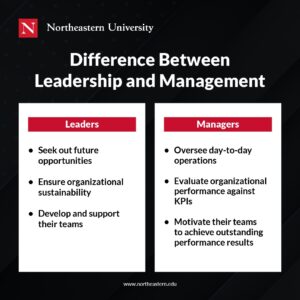As a professional, attaining leadership skills is important—and not just for management roles. People often mistakenly equate leadership with management, but there are fundamental differences between the two; they are separate and distinct skill sets. Management involves a focus on executing functions and a strategic vision for the organization, whereas leadership is about motivating people toward a common goal. In fact, you don’t have to have the title of manager or have direct reports to be a leader. You can demonstrate leadership skills in any role.
Read on to learn more about the differences between leadership and management skills, and learn how you can improve your leadership skills to effect change.
Differences in Leadership Skills vs. Management Skills
“Managers support an organization by executing tasks, functions, and activities that align with the organizational strategy,” says Mary Ludden, assistant teaching professor and Senior Vice President for Global Network and Strategic Initiatives at Northeastern University.
Management Skills
Management skills are critical to the success of any enterprise, she adds. “Management skills allow an individual to become highly attuned to achieving an established set of targets while supporting their teams,” Ludden says. “Many time managers operate in highly complex environments, with significant responsibilities, and constantly motivate their teams to achieve outstanding performance results. That is no easy task.”
In contrast, Ludden says, “Leaders serve as the cheerleaders-in-chief for their teams, but there’s a lot more to it than that. Leadership establishes the mission, vision, and strategy of the organization. More importantly, leadership offers ongoing clarity to their teams to ensure that the objectives that align with the strategy are transparent.” Many professionals who possess strong leadership skills are also managers, but they don’t necessarily have to be, she adds.

Learn More about Northeastern’s Bachelor of Science in Management Program
Get the leadership skills you need to advance your organization and your career.
Leadership Skills
Leadership skills at any level allow an individual to stretch beyond their day-to-day focus and imagine the future. “Leaders are constantly scanning the internal and external environments to help inform the direction they take the organization in,” says Ludden. “Organizations are realizing that the leaders of the future need to embrace uncertainty, be a catalyst for change, and create a culture of innovation.”
“The distinction between leadership and management is on the area focus,” says Ludden. “Managers ensure that the day-to-day operations are executed at exceptional levels, and constantly evaluate their performance against a series of key performance indicators.
Leaders, rather than focusing on day-to-day activities, strive to be forward-looking across a horizon of time to seek out future opportunities. This ensures the sustainability of the organization. That forward-looking mindset crosses a myriad of activities, which may include seeking new markets, expanding product lines, and most importantly, ensuring they are laser-focused on developing and supporting their teams.”
What Makes A Good Leader
Ludden also says there are many myths as to what constitutes a good leader, and it’s important to dispel these misconceptions. “It’s common for people to think that leadership means being the boss and making all the decisions,” she says. “In reality, leadership is about identifying key talent and allowing your team to support which direction the organization takes. Another misconception is that leadership is easy. It’s actually incredibly difficult and requires great resilience and fortitude. Strong leaders need to have the right combination of courage, integrity, and futuristic thinking.”
Examples of Leadership in Practice
Author Susan Cain is one example of a less traditional, yet highly effective, leader. As a self-professed introvert, Cain is challenging businesses and schools to look beyond an extrovert-dominated culture and foster leaders with different temperaments. Rooted in academic research, her work encourages organizations to harness the creativity of all employees by rethinking hiring and office design practices. Similarly, she is inspiring educators to avoid constant collaboration and give introverted students opportunities for quiet reflection where they can do their best work.
Northeastern University President Joseph Aoun is another example of a thought leader who is reimagining education in the face of increasingly smart machines. He has a clear vision which recognizes the need to “robot-proof” students; that is, educating the next generation of university students to fill needs in society that even the most sophisticated artificial intelligence agent cannot.
“President Aoun is forcing a dialogue, not just in higher education, but across the world on the change needed for individuals to be successful in an age of artificial intelligence,” says Ludden. “He is a great example of a catalyst for change, who is passionate about his organization and our learners, but is out in front of the pack leading the charge for a reimagined form of learning.”
The Demand for Leaders
Nearly all organizations benefit from having team members with the ingenuity and initiative to spark change and positively influence those around them. This demand for effective leadership is why an increasing number of employers are seeking leadership skills in staff across the business.
“In an era of accelerated disruptions, from economic to technology to globalization, leaders of today’s world need to succeed in a highly ambiguous environment, which requires critical thinking skills and bold decision making,” Ludden remarks.
Gaining leadership skills opens up a world of opportunities to drive change in powerful ways, aid in your professional development, and to advance your career. To hone these skills, Ludden encourages “anyone looking to gain leadership skills to engage in a program that consists of experiential learning. Learning concepts while applying them in an experiential learning environment helps students gain valuable skills that can be immediately applied in the workplace.”
“To me, the greatest leaders have an insatiable curiosity, are passionate about their team, and constantly push their organizations to transform and evolve. I think any trait—including leadership—can be learned, honed, and elevated when you are a lifelong learner and have a passion for learning in an experiential environment.”
Ready to improve your leadership skills to accelerate your career? Take the first step by learning more about Northeastern’s Bachelor of Science in Management program.
